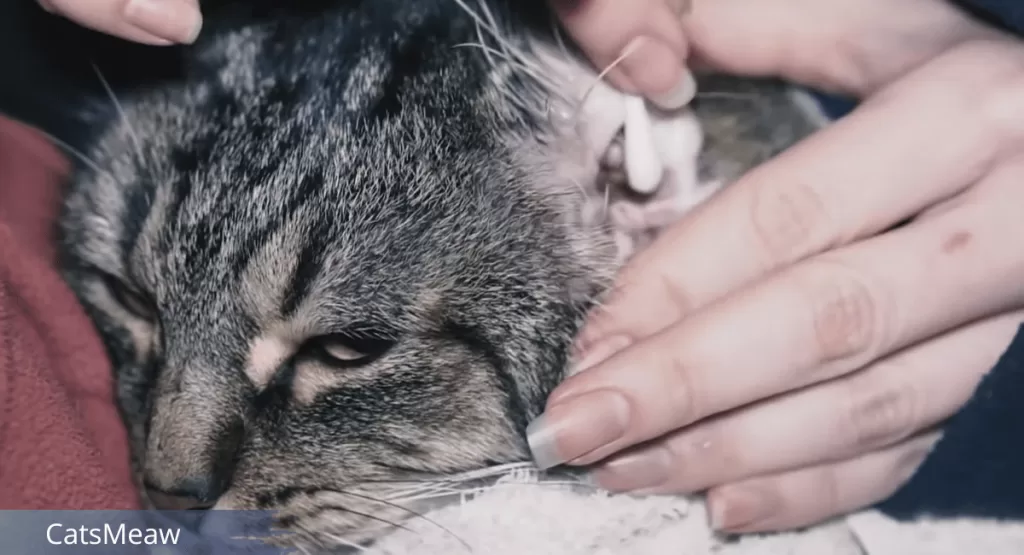Because you are a cat owner, you know how important it is to keep your feline friend healthy and comfortable. One common issue that cats may experience is itchy ears. Understanding the causes and treatment options for cat itchy ears can help you provide the care your furry companion needs.

Itchy ears in cats can be caused by a variety of factors. One of the most common and known causes is ear mites. These tiny parasites can irritate your cat’s ears and lead to intense itching. Another potential cause is allergies. Cats, like humans, can be allergic to certain substances such as pollen, dust mites, or certain foods.
Infections, such as yeast or bacterial infections, can also cause itchy ears in cats. Other factors, such as ear wax buildup or foreign objects in the ear, can contribute to the discomfort your cat may be experiencing.
Table of Contents
Common Causes of Cat Itchy Ears
- Ear Mites: These microscopic parasites are a common cause of itchy ears in cats. Ear mites are can easily spread from one cat to another that is why it is highly contagious. They feed on the wax and oils in your cat’s ears, causing irritation and itching. If you notice your cat constantly scratching their ears or shaking their head, ear mites may be the culprit.
- Allergies: Cats can develop allergies just like humans. Common allergens include pollen, dust mites, certain foods, and even certain types of litter. If your cat has itchy ears along with other allergy symptoms like sneezing or skin rashes, allergies may be to blame. Identifying and avoiding the allergen can help alleviate your cat’s discomfort.
- Infections: Ear infections can cause significant discomfort and itchiness for your cat. Yeast and bacterial infections are the most common types of ear infections in cats. These infections can occur due to a variety of factors, such as excess moisture in the ear, allergies, or a weakened immune system. If your cat has itchy ears accompanied by odor, discharge, or redness, an infection may be present.
- Ear Wax Buildup: Excessive ear wax can accumulate in your cat’s ears and cause irritation. This can lead to itching and discomfort. Some cats naturally produce more ear wax than others, and certain breeds may be more prone to ear wax buildup. Regular ear cleaning can help prevent wax buildup and reduce the risk of itchy ears.
- Foreign Objects: Cats are curious creatures and may occasionally get foreign objects stuck in their ears. This can cause irritation and itching. Common foreign objects include grass awns, foxtails, or even small insects. If your cat is constantly pawing at their ear or tilting their head to one side, there may be a foreign object causing the itchiness.
Symptoms of Cat Itchy Ears
Recognizing the symptoms of itchy ears in your cat can help you determine the underlying cause and provide appropriate treatment. Some common symptoms of cat itchy ears include:
- Frequent scratching: If your cat is constantly scratching their ears or rubbing their head against furniture or walls, it may be a sign of itchy ears.
- Head shaking: Cats with itchy ears often shake their head vigorously in an attempt to alleviate the discomfort.
- Redness and swelling: Itchy ears can become red and swollen due to the constant scratching and irritation.
- Ear discharge: Infections or mites can cause your cat’s ears to produce abnormal discharge. This discharge may be brown, black, or yellow in color and have a foul odor.
- Behavioral changes: Cats with itchy ears may become irritable, restless, or lethargic. They may also lose their appetite or show signs of discomfort when touched around the ears.
If you notice any of these symptoms in your cat, it’s important to address the issue promptly to prevent further discomfort and complications.
Treatment Options for Cat Itchy Ears
Treating cat itchy ears depends on the underlying cause. Here are some common treatment options:
- Medication: Your veterinarian may prescribe ear drops or ointments to treat infections or mites. These medications are typically applied directly into the ear canal and help alleviate the itching and inflammation.
- Allergy Management: If allergies are causing your cat’s itchy ears, your veterinarian may recommend allergy testing to identify the specific allergens. Once identified, you can take steps to minimize exposure to these allergens, such as using hypoallergenic litter or changing your cat’s diet.
- Ear Cleaning: Regular ear cleaning can help prevent wax buildup and reduce the risk of infections. Your veterinarian can recommend an appropriate ear cleaning solution and provide guidance on how to safely clean your cat’s ears.
- Surgical Intervention: In some cases, foreign objects lodged in the ear may require surgical removal. Your veterinarian will assess the situation and determine if surgical intervention is necessary.

Remember, it’s essential to follow your veterinarian’s instructions and complete the full course of treatment to ensure proper healing and prevent recurrence of itchy ears.
Home Remedies for Cat Itchy Ears
While it’s always best to consult with your veterinarian for proper diagnosis and treatment, there are some home remedies that may provide temporary relief for your cat’s itchy ears. Here are a few options:
- Warm Compress: Applying a warm compress to your cat’s ears can help soothe itchiness and reduce inflammation. Use a clean cloth soaked in warm water and gently hold it against your cat’s ears for a few minutes.
- Herbal Remedies: Some cat owners find that herbal remedies, such as chamomile tea or aloe vera gel, can provide relief for itchy ears. However, it’s important to consult with your veterinarian before using any herbal remedies to ensure they are safe for your cat.
- Avoid Irritants: If you suspect that certain substances or products are causing your cat’s itchy ears, try eliminating them from your cat’s environment. For example, switch to a different type of litter or avoid using strong cleaning products near your cat’s ears.
Related: Cat Grooming Guide: Best Tips and Advice
Remember, home remedies should not replace proper veterinary care. If your cat’s itchy ears persist or worsen, it’s crucial to seek professional advice.
Preventing Cat Itchy Ears
Prevention is key when it comes to cat itchy ears. Here are some tips to help keep your cat’s ears healthy:
- Regular Cleaning: Clean your cat’s ears regularly using a veterinarian-approved ear cleaning solution. This can help remove excess wax and debris, reducing the risk of infections and itchy ears.
- Avoid Overcleaning: While regular cleaning is essential, it’s important not to overclean your cat’s ears. Overcleaning may cause irritation and disrupt the natural balance of the ear. Consult with your veterinarian to determine the appropriate frequency for ear cleaning based on your cat’s needs.
- Allergen Management: If your cat has allergies, take steps to minimize their exposure to allergens. Keep your home clean, vacuum regularly, and consider using air purifiers to reduce airborne allergens. Additionally, follow your veterinarian’s advice regarding diet and potential allergens in your cat’s environment.
- Regular Check-ups: Schedule regular check-ups with your veterinarian to monitor your cat’s overall health, including their ears. Early detection of any issues can prevent them from progressing into more severe conditions.
When to See a Veterinarian for Cat Itchy Ears
While some cases of itchy ears can be managed at home, it’s important to know when to seek veterinary care. You should consult with your veterinarian if:
- Your cat’s itchy ears persist for more than a few days.
- Your cat shows signs discomfort or pain.
- The itchiness is accompanied by other symptoms such as swelling, redness or even discharge.
- Your cat’s behavior or appetite changes.
- You suspect a foreign object is lodged in your cat’s ear.
Your veterinarian can properly diagnose the underlying cause of your cat’s itchy ears and provide appropriate treatment.
Tips for Maintaining Your Cat’s Ear Health
In addition to regular cleaning and preventive measures, here are some tips to help maintain your cat’s ear health:
- Avoid Excessive Moisture: Excess moisture in the ears can create an environment favorable for infections. When bathing your cat, take care to keep their ears dry and avoid getting water inside them.
- Monitor Outdoor Activities: If your cat spends time outdoors, keep an eye on their activities. Cats can easily pick up foreign objects or encounter allergens while exploring. Regularly check your cat’s ears for signs of irritation or foreign objects.
- Handle with Care: When cleaning your cat’s ears or applying any medication, be gentle and handle their ears with care. Cats can be sensitive, and rough handling may cause further discomfort.
- Regular Grooming: Regular grooming sessions allow you to check your cat’s ears for any abnormalities. Brushing your cat’s fur can also help prevent the accumulation of allergens and reduce the risk of itchy ears.
Conclusion
Cat itchy ears can be a bothersome and uncomfortable issue for your feline companion. By understanding the common causes, recognizing the symptoms, and knowing the treatment options, you can provide the necessary care and relief for your cat. Remember to consult with your veterinarian for proper diagnosis and treatment, as well as to follow preventive measures to maintain your cat’s ear health. With your love and attention, your cat can enjoy a life free from itchy ears and stay purrfectly happy.
